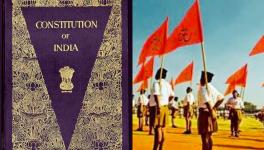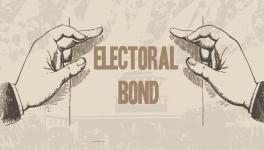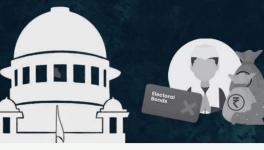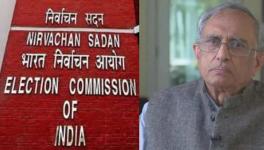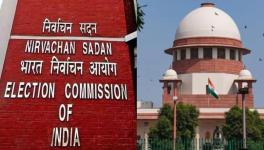Electoral Bonds: As Fresh Tranche Rolls Out, Will SC Help Keep Track?

The government has announced that the 15th round of the sale of electoral bonds will begin from January 1, 2021 and continue until January 10, 2021. The constitutional validity of the scheme has been challenged in the Supreme Court, where the matter has not been heard since January 2020.
On December 21, 2020, the Central Information Commission, in response to an appeal from Right to Information applicant Vihar Durve, held that the disclosure of names of those making donations and parties receiving them would serve no public interest. The order held: “There appears to be no larger public interest overriding the right to privacy of the donors and donees concerned.”
In her lecture in memory of KG Kannabiran, lawyer Usha Ramanathan flags the growing transparency of citizens to the state; and the increasing opacity of the state to its citizens. What is striking in the CIC ruling of December 21, 2020 is the upholding of the privacy of donees, political parties, already declared “public authorities” in an earlier order of the CIC!
Writing in The Hindu newspaper on December 30, 2020, advocate Manuraj Shanmugasundaram, spokesperson of the Dravida Munnetra Kazhagam party, described how the electoral bond scheme would leave Indian democracy broken.
Shanmugasundaram writes: “The scheme creates banking instruments for donation of funds to political parties facilitated by the SBI. It conceals the identity of the donors and donees as well as the amount of donation. In effect, the scheme is not transparent, promotes arbitrariness and is therefore illegal.”
This CIC order of December 21, 2020, shuts the door to many RTI queries. Commodore Lokesh Batra has been seeking information under the RTI on this scheme. In response to a query from him, State Bank of India said that 12,773 electoral bonds have so far been sold in 14 phases.
The total value of these was over Rs 6,472 crore. The SBI letter is dated December 24, 2020.
Mumbai (31.16%) and Kolkata (22.98%) saw sales of a larger proportion of electoral bonds of the Rs 1 crore denomination, the largest sum possible, than national capital Delhi (14.67%).
The New Delhi main branch of the SBI saw over 9,000 EBs encashed, the largest share of encashments. Commodore Batra points out that the number of bonds encashed would not, however, give a proper notion of the amount gathered up through the bonds; while the smallest-value bond is Rs 1,000, the highest-value is Rs 1 crore.
Bonds worth over Rs20 crore were not encashed, and this amount has been transferred to the PM National Relief Fund.
Reports showed that the bulk of all donations – up to 95%– was flowing into the coffers of the ruling Bharatiya Janata Party or BJP, which was making windfall gains through the scheme. The SBI does not adequately monitor those encashing the bonds, and there is evidence to suggest that parties that are not eligible for them have encashed these bonds.
There is no upper limit on the donation amount, and political parties can redeem the amount within 15 days; yet, there have been instances of the bonds being redeemed after that time period.
The donor’s identity is supposedly not known to anyone but the bank. However, news website Quint reported that a hidden alphanumeric links the bond to its donor. While the general public will not know the identity of the donor, the government can trace the source of the donation through this number that is not visible to the naked eye. The Quint purchased two bonds, and then got them examined at a laboratory to make this revelation. The numbers are visible when exposed to ultra violet light; bank officials however claimed that this was just a “security feature”.
The scheme was notified in January 2018; CPI (M) and two NGOs – Association for Democratic Reforms and Common Cause – have taken the matter to the Supreme Court, challenging the constitutional validity of the scheme, which was certified as a Finance Act. The petitioners in the SC have said that the scheme was introduced as a Finance Act, which means it escaped the scrutiny of the Rajya Sabha.
Ninety-eight per cent of the bonds sold were of the Rs1 crore denomination – the bonds are sold in Rs1000, Rs10,000, Rs 1 lakh, Rs10 lakh and Rs1 crore denomination. What this clearly proves is that the EB scheme is used almost entirely by corporate donors. Such funding from corporate bodies can come with strings attached, even though it is claimed that donors remain anonymous.
And does the scheme place any burden on taxpayers? The bonds, which cost Rs28 each to print, are printed at government expense. The total printing cost so far has been about Rs2 crore. SBI receives a commission, and the transaction cost is borne by the government – this has so far come to over Rs3 crore. The bonds in the lower denomination are not sold in large numbers, with less than 200 of over two lakh printed ones sold, so there is enormous wasteage.
The Reserve Bank of India and the Election Commission had both raised red flags against the introduction of the EB scheme, which the government chose to ignore.
Constitutional amendment to the Representation of The People Act, 1951 exempts political parties from reporting donations received through these bonds to the Election Commission. There is thus no way to tell if the donations are coming in from foreign sources or domestic ones.
It is now a whole year since the SC last heard this matter in January 2020, when it gave the Election Commission time to respond to a demand for a stay on the scheme. Suppressing information about political financing will hollow out Indian democracy. It is imperative that these concerns are urgently addressed, even as the New Year begins with the sale of a fresh tranche of these bonds.
The writer is a freelance journalist.
Get the latest reports & analysis with people's perspective on Protests, movements & deep analytical videos, discussions of the current affairs in your Telegram app. Subscribe to NewsClick's Telegram channel & get Real-Time updates on stories, as they get published on our website.











